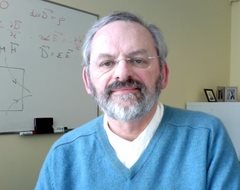
Professor Andrew Cliffe
It is with very great sadness that we announce that Professor Andrew Cliffe passed away on 5 January 2014. Andrew was an outstanding man, always consistent in his absolute respect for all people, and a mathematical scientist whose research was original and penetrating and whose teaching was inspiring. We have been privileged to have had Andrew as a colleague and he will be sorely missed. Our thoughts and sympathy are with Andrew’s family.
Andrew Cliffe, Professor of Computational Applied Mathematics at The University of Nottingham passed away after a long illness. Despite his serious illness, Andrew remained bright, cheerful and as optimistic as ever. The optimism was strongly underpinned by Andrew’s faith, Andrew serving as an elder in the church that he and his family attended. This very brief outline of his life is based in part on an interview in 2010 that captures the essential qualities of the man: his enthusiasm, openness, humility and humanity.
Andrew was born in South Cheshire to a farming family, and always bemoaned the many early mornings he spent milking cows. He left school at 16 to work on the family farm but, after his father had deliberately inflicted on him a summer of backbreaking labour to dissuade him from following this path, he returned to Nantwich and Acton Grammar School to study Mathematics, Further Mathematics, Physics and Chemistry at A level. Indeed, his love of mathematics was lifelong: his mother remembers him insisting on taking mathematics books on family holidays, even sharing a small tent with a pile of them. After receiving his A-level results, his head teacher arranged an interview for him at Churchill College, Cambridge, and he went up the following year, having spent a gap year doing research at the Royal Aircraft Establishment in Farnborough. Andrew graduated with a First in Mathematics (though he only found this out after sending his future wife, Wendy, to Cambridge to look up his results!) and joined Harwell Laboratory, in spite of attending his interview wearing a large woolly jumper under his suit in an attempt to disguise his having forgotten to take a tie. Andrew entered UKAEA as a Scientific Officer, based in the Theoretical Physics Division at a time when it had three Fellows of the Royal Society working there. Andrew worked on developing finite-element codes for computational fluid dynamics.
In the 1980s, stimulated by hearing a seminar at Harwell given by Brooke Benjamin, Andrew’s interest in bifurcation theory was ignited and led to Andrew’s long and fruitful collaboration with Tom Mullin, who was then Brooke Benjamin’s postdoc at Oxford. Andrew and Tom produced significant and novel results concerning the Taylor-Couette problem, which is fundamental to the understanding of the onset of turbulent flow and the role of geometric symmetry-breaking in the Navier-Stokes equations and associated chaotic dynamics. Their work in the Journal of Fluid Mechanics in 1985 is widely acknowledged as a classic. Andrew’s work was characterised by the manner in which he enriched his numerical work with fundamental ideas from the then rapidly growing field of nonlinear dynamics. Andrew’s interactions with academia grew, inter alia through a Royal Society Industrial Fellowship at Oxford in 1986-88 and through the supervision of CASE-sponsored research students.
In the mid-90s UKAEA was privatised and Andrew’s work, first for AEA Technology plc then for Serco Assurance, became more commercially focused, which in turn began to constrain Andrew’s freedom to engage with blue-skies research. In 2005 Andrew resigned his post of Chief Mathematical Modeller and took up a Chair in Computational Applied Mathematics in the School of Mathematical Sciences at The University of Nottingham. The Chair was initially co-sponsored by Rolls-Royce plc and Andrew quickly succeeded in producing fundamental results that had real impact in the aerospace industry. Meanwhile he also fully engaged with the challenge of developing a scientific computation group comprising applied and theoretical numerical analysts and mathematical modellers. Andrew inspired and encouraged by example and his influence was deep and wide-ranging. He admitted to surprising himself by proving to be a very popular teacher: he always found time to help students and his teaching was consistently enthusiastic, progressive, thoughtful and stimulating.
The scope of his research encompassed a range of applications to groundwater flow, ice-sheet modelling, computing, nonlinear systems, computational fluid dynamics, turbulence, combustion, and, following his move to Nottingham, uncertainty quantification, energy and transport.
Andrew leaves behind an extraordinary legacy and he will be sorely missed: those who met Andrew were inevitably influenced and enriched by the experience - Andrew was always interested in the human being with whom he was interacting. He loved mathematics and the weird phenomena it could describe and/or explain; his energy and enthusiasm for science was infectious. Although Andrew gave many hours to helping students, encouraging staff and pursuing his own work, he never neglected those closest to him – he was an immensely proud, committed and loving family man. He is survived by his wife Wendy, son Joel, daughter Gabrielle, and grandson Zachary.
David Riley
January 2014
Posted on Wednesday 26th February 2014